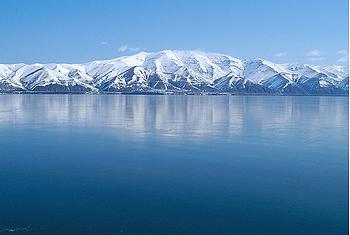Armenia's Prized Lake Threatened by Mining
Published by MAC on 2011-12-27Source: Environmental News Service
Agarwal's criminal legacy hasn't disappeared
Armenian environmentalists are stepping-up their opposition to a gold processing plant which threatens one of the country's most important sources of fresh water.
In fact, the campaign to protect Lake Sevan - the largest of its kind in the Caucasus - goes back several years.
In 2005, a range of charges had been laid against the company then operating the nearby gold mine (Sod, or Sotk).
The company was Sterlite Gold, owned by the notorious Anil Agarwal who, two years earlier, had listed Vedanta Resources plc on the London Stock Exchange.
Agarwal was accused of various acts of commission and omission in Armenia, some of them criminal.
Although he professed his determination to remain in the country, Agarwal made it clear that this depended on obtaining permission to site a processing plant on the shores of Lake Sevan, to save in transport costs.
Later that year, the first formal charges were brought against the company.
Shortly afterwards, however, Agarwal effectively sold the Armenian operations to himself, in the shape of a takeover of Sterlite Gold by Vedanta Resources plc, of which 54% was then held by him and his family.
Armenia revived the charges against Agarwal in early 2007; three months later, its public prosecutor announced that the company was likely to be fined around US$46 million.
Meanwhile, the government suspended all operations of both the mine and the processing plant, effectively declaring Agarwal a persona non grata.
Agarwal thereupon sold his entire Sterlite Gold holdings, and the licence to operate the Zod Gold operations, to a distinctly suspect, Russian-backed, Georgian Group called Madneuli.
Madneuli later transferred the licenses to its subsidiary, GeoProMining.
Now, that company faces similar opposition to the most critical part of the plan that our sullied Indian hero had put forward to save his investments in the country.
See: http://www.minesandcommunities.org/article.php?a=22&l=1
Greens: Armenia's Prized Lake Threatened by Mining
By Galust Nanyan
Environmental News Service (ENS)
13 December 2011
YEREVAN, Armenia - Environmental activists in Armenia are stepping up their year-long campaign against a gold-processing plant, which they believe poses serious risks to a unique lake that provides much of the country's drinking water.
 |
| Lake Sevan supplies drinking water to much of Armenia Source: menq.am |
Their concerns center on an ore-crushing plant at the Sotk gold mine, owned by the GeoProMining company. The plant was completed this year but is at a standstill while the environment ministry runs checks on its impact on the surrounding area.
Gold-bearing ore from the Sotk mine used to be taken elsewhere for processing, but the company wanted to streamline its operations by crushing the rock locally.
In 2009, a project to build a plant for the complete cycle of processing ore into gold, which would have involved the use of cyanide to separate the precious metal from other minerals, was shelved.
Environmentalists still fear that the partial processing done by the new unit will release other minerals into the freshwater system that feeds Lake Sevan, the largest lake in the Caucasus.
The lake is a major source of drinking water for people in the Armenian capital Yerevan and much of the rest of the country.
"The waste created by processing ore will end up in the lake," warned Gagik Tadesvosyan, an environmentalist from the SOS Sevan group. "Agricultural land is being reassigned for mining operations, and that creates a carcinogenic environment."
Inga Zarafyan of the Ecolur pressure group was among a group of activists who visited Sotk to inspect the crushing plant in October. They say the unit is in breach of a law protecting Lake Sevan's catchment area from ore processing.
"The machinery will smash the rock, sift it, remove gold and silver from the ore, and leave all the unwanted remains to end up in Lake Sevan," she said.
Environmentalists want the government to halt operations at the crushing plant, arguing that the nearby rivers Sotk and Masrik are already polluted with traces of toxic metals.
Zarafyan said ore processing at Sotk was expected to leave 100 million tons of waste material, which would leak sulphides, chromium compounds, cadmium and other substances into the rivers and then into the lake itself.
GeoProMining spokesperson Ruzanna Grigoryan denied that the company was doing anything illegal and said the technologies it uses are modern and efficient.
GeoProMining Gold says it has all the paperwork it needs to operate the crushing plant, an assessment with which Armenia's energy and natural resources ministry agrees.
The environment ministry, however, appears to disagree. Its department that is responsible for checking ecological impacts says the company has been ordered to halt ore-crushing operations at Sotk until a thorough analysis can be carried out.
"The company has yet to present any documents," said Henrik Grigoryan, deputy head of the body that conducts the environmental checks.
Kolik Shahsuvaryan, the local government chief in Sotk, refused to be drawn into stating his view of the gold mining operation.
"I try to adopt a neutral position or just not to talk about it. Let the government decide," Shahsuvaryan said. "However, I have discussed it with the company's leadership. Construction [of the ore-crushing unit] has been completed. I can't say whether it meets environmental standards or not."
GeoProMining Gold is clearly confident it will overcome objections to the new ore-crushing facility. It is expanding capacity at its plant in Ararat, where it conducts the more complex operations to extract gold and silver from ore, and expects annual production to rise from the current level of 30,000-40,000 ounces to 150,000 ounces.
Galust Nanyan is a correspondent for the www.yerkir.am news site in Armenia. This report was originally published by the Institute for War and Peace Reporting.